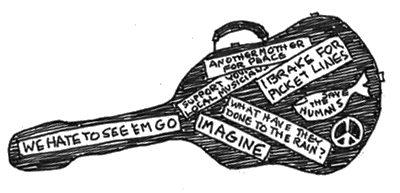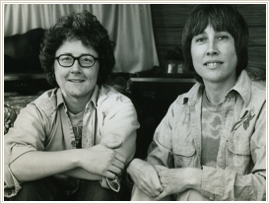


On May 5, I posted an excerpt
from Malvina’s newsletter where she wrote about her appearance at the
National Women’s Music Festival. In the next issue of Sporadic Times,
her first item dealt with the festival:
There
were interesting comments on my report of the Women’s Music Festival in
Champaign, Ill. One who “really appreciated (my) eloquent expression of
the most constructive way to work for human liberation” had a good
observation about my shying away from the title feminist.
“As the word is used here, it is simply to describe the kind of beliefs
you and I both hold. I like the term because ‘supporter of the women’s
liberation movement’ is too bulky and ‘women’s libber’ is horribly
offensive and flippant. Also ‘feminist’ implies a continuity with our
history of feminism--Susan B. Anthony etc.”
Another
sister wrote, “Separatism is a tricky question in my mind. The
Separatists at the music festival whom you spoke of do seem unreasonable
and impractical for that situation. However, Separatism as a short term
goal is often used by oppressed people such as Afro-Americans and
Chicanos, in an attempt to build group strength and redefine their
identities, which have been warped and weakened by the dominant group in
society.”
The
year after my mother circulated her letter at the National Women’s
Music Festival, she performed there again, and this time my then partner
Carole and I were in the audience. Carole was one of the
organizers of Women Library Workers, which started in the Bay Area in
1975, and in 1977 we were having a national meeting in Detroit just
before the Festival in Champaign. The organization had rented the top
floor of the Detroit Women’s Building and many of us were staying there
as well as meeting there. Carole and I shared a room but were being
circumspect about our relationship. Carole was the field organizer,
traveling around the country helping new chapters get going and we were
afraid WLW could be seen as lesbian organization and straight women
might stay away.
A
few other women who had been at the WLW meeting were also at the
festival. My mother sang “Carolina Cotton Mill” which had been inspired
by a visit from the writer Jill Johnston, who was wearing blue jeans and
talking about having her chakras read.
Carolina Cotton Mill Song
Words and music by Malvina Reynolds; copyright 1976 Schroder Music Company, renewed 2004.
Oh I love to get into my clean bed
With its sheets so fair and white,
And when I am in my clean bed,
I sleep thru most the night,
And my dreams are hardly troubled
By the worrying of my mind
For the workers who die of the brown lung
In the mills of Caroline.
Chorus:
Oh the mystical people, they think they are wise,
With the smooth on their faces and stars in their eyes,
But the truths of this system are spoken and sung
By the workers who bear the brown lung.
Oh the mystical people, they think they are wise,
With the smooth on their faces and stars in their eyes,
But the truths of this system are spoken and sung
By the workers who bear the brown lung.
Oh it's Burlington and Cannon
And the names we wives know well,
Who advertise the sheets and towels
And give us the old soft sell,
And they'd rather buy the government men
With promotions here and there,
Than pay out company profits
For to clean the cotton mill air.
And the names we wives know well,
Who advertise the sheets and towels
And give us the old soft sell,
And they'd rather buy the government men
With promotions here and there,
Than pay out company profits
For to clean the cotton mill air.
(Chorus)
Oh some people talk of the yin and yang
And walk in a kharma daze,
As though the influence of the stars
Could change mill owners ways,
But the people who work in the cotton mills
They know how the world is run,
And they need some help of an earthly kind
To live their time in the sun.
And walk in a kharma daze,
As though the influence of the stars
Could change mill owners ways,
But the people who work in the cotton mills
They know how the world is run,
And they need some help of an earthly kind
To live their time in the sun.
(Chorus)
Oh the mystics they wear the blue jeans
But their heads are in the stars,
For they do not know how the denim is made
Nor the years of workers' wars.
And my place is not in an ivory tower
Or seeking some power divine,
But it's out on the bricks with the union folks
At the mills in Caroline.
But their heads are in the stars,
For they do not know how the denim is made
Nor the years of workers' wars.
And my place is not in an ivory tower
Or seeking some power divine,
But it's out on the bricks with the union folks
At the mills in Caroline.
(Chorus)
Carole
said that song would put off a lot of the audience, who were into
new-age stuff. I assured her that Mom would now sing “We Don’t Need the
Men,” which she did. Carole said, “That will make everybody happy
again.” “Yes,” I said, “but now she will sing her song for my father,
and annoy them again.” Which she did, introducing the song, “Bury Me in
My Overalls,” by saying it was for her dear husband whom she had been
with for forty years, and with whom she had had a daughter who was now
happily married to a woman. Carole and I looked at each other and sank
down in our seats, outed by my mother. One of the straight women from
WLW told us later that she had wondered about us in Detroit, but when
our van was broken into and our Sisters’ Choice quilt stolen and we
didn’t fall into each other’s arms, she figured she was wrong. My mother
said afterwards that she realized she should have checked with us
before she said anything. I figured it had just come out in the moment,
but now I don’t think so. Ellen Stekert interviewed someone who had
heard her introduce the song in the same way, and this woman had only
been to the festival the year before--the year Mom handed out the
letter--so probably my mother was repeating in our hearing in 1977 the
introduction that had worked in 1976.
This just in: I talked to my friend Christine Jenkins
a few days ago and she said she had been at the NWMF where my mother
handed out her letter. She said Malvina’s wording of the piece in
Sporadic, “The letters were distributed at the door of the auditorium,”
made it sound like she did not distribute her letter herself, which of
course she did. (She wrote it that way because she was referring to both
her letter and others.) Christine said it was clear to her at the time
that Malvina spoke from the stage about her “daughter who is happily
married to a woman” to give herself creds (Christine’s word) with the
largely lesbian audience after they saw her letter disagreeing with the
separatists.
In other news: Saw Note by Note Sunday night. It’s like you know this is a big country but you don’t really know how
big till you drive across it? Well, you know a piano is intricate but
not how intricate until you see one being built before your eyes. Plus
it’s a beautiful movie.
©2008 by Nancy Schimmel
Kristin Lems/*
Thanks
for recounting this and from the lengthy quote from her Sporadic
Times. I also have a copy of the mimeographed letters Malvina
distributed - which is exactly the same as quoted here. Yes,
Malvina was at one end of the auditorium steps, and others were at the
other end urging men to stay away from the show. It was
incredibly tense!! And I was in the audience that evening
when she "outed you" - she said "I spent [forget the number?] years
happily married to a man, and now my daughter is happily married to a
woman." It was very matter of fact, not to curry favor, I
think, but as an intro to her song "Love Somebody." What a
woman!
Friday, December 18, 2009 - 11:07 PM
Add comment on home page

Tuesday, June 10, 2008


MALVINA AT THE NWMF, PART II






